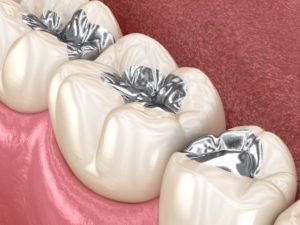
Did you know that amalgam or metal fillings have been used for more than 150 years? When you think about the millions of people who have benefitted from these fillings over time, you can see why they were so popular for so long: they last for an average of nearly 13 years and are very strong!
So it may come as a surprise that amalgam fillings are banned in several countries and have been deemed potentially harmful by the Food and Drug Administration. Although amalgam fillings have a long history in saving decayed teeth, there are several dangers that metal fillings could pose. Keep reading to find out more about these dangers and a safer alternative.

Risk #1: Metals Are Temperature Sensitive.
Although metals are extremely durable, they are susceptible to expanding and contracting with extreme temperatures. With heat, the filling can expand and potentially cause your remaining tooth structure to crack or weaken. As a result, the tooth is at further risk of decay or further damage.

Risk #2: Metals Can Corrode Over Time.
The chemicals that make up metal fillings are complex, and they can react to the substances they come in contact with inside your mouth. Over time, the metal can corrode, allowing bacteria to access the interior of the tooth, increasing your chances of deep, painful cavities.

Risk #3: Metal Fillings Can Be Uncomfortable.
In addition to expanding and contracting, metal is a good temperature conductor. This means that if your filling comes in contact with hot coffee or a freezing cold popsicle, your sensitive tooth nerve center may feel it. In other words, your metal fillings could make your teeth feel more sensitive to high or low temperatures.

Risk #4: A Lot of Tooth Structure Is Removed for Amalgam Fillings.
Even if your cavity is small, amalgam fillings require that a substantial amount of tooth structure be removed because this metallic material does not bond well to natural enamel. Sadly, this means that you could lose healthy tooth structure in order to get a highly noticeable metal filling.

Risk #5: Amalgam Contains Mercury.
As modern medicine and science have made discoveries, mercury has been found to cause many health problems. In the short term, mercury poisoning causes coughing or shortness of breath, chest pain, vomiting, diarrhea, and in the long term, it can affect the nervous system and brain, leading to irritability, memory loss, and insomnia. Its toxic properties make mercury unsafe for human consumption, and many dental professionals believe the amount in metal fillings could be dangerous, releasing metallic vapor that is inhaled on a regular basis.

Composite Fillings: A Safer Choice
Completely metal free, composite resin fillings are made of dental plastic mixed with ceramic particles. As a result, these “tooth-colored” fillings do not pose the same threats as amalgam fillings. In fact, composite fillings chemically bond well to tooth enamel, which means less tooth structure needs to be removed in the process. Also, these fillings are colored to blend in with the rest of the tooth, making it difficult to tell that the tooth ever had decay in the first place.
As a patient, you have every right to insist on getting the best care possible, and when it comes to fillings, the safer, smarter option is composite resin, not amalgam. Your fillings can give you back oral function as well as your smile’s appearance—and keep you safe!
About the Author
Although Dr. Makadia has undergone advanced training in complex procedures, he also excels in simpler treatment like composite fillings. Within the last three years alone, he has taken far more than the required number of continuing education hours—more than 150! As a result, he is aware of the latest advancements in dentistry and brings the best back to our patients. If you have questions about fillings or other materials, you may schedule an appointment with Dr. Makadia at Sunrise Dental Service online or call the office at 631-405-4390.
